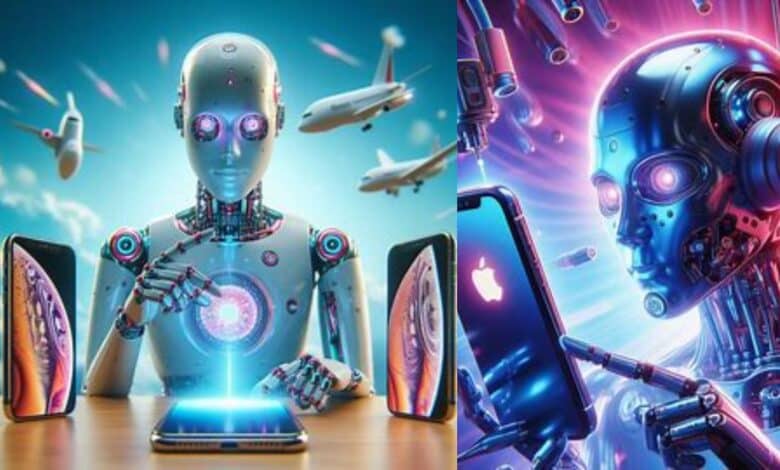Apple’s New AI Move Just Changed The Game For All iPhone Users

Apple’s new AI move just changed the game for all iPhone users, marking a significant shift in the tech landscape. This groundbreaking development is set to redefine how we interact with our iPhones, bringing about a new era of possibilities and challenges. The move, which involves a major upgrade in Apple’s artificial intelligence capabilities, promises to enhance user experience like never before.
However, as with any major technological advancement, it also brings its own set of concerns. In this article, we delve into the details of this AI move, exploring its implications for iPhone users, and how it stands to alter the dynamics of smartphone usage. Strap in as we embark on this exciting journey into the future of AI in the world of iPhones.
Apple’s New AI Move
In a bold stride towards the future, Apple has recently acquired the Canadian startup DarwinAI. This acquisition is a significant part of Apple’s new AI move, which is set to revolutionize the experience for all iPhone users.
DarwinAI specializes in technology that can inspect components during the manufacturing process. More importantly, it has developed tech that can make AI systems smaller and faster. This aligns perfectly with Apple’s focus on running AI on devices rather than entirely in the cloud.
The acquisition of DarwinAI is not just about the technology; it’s also about the talent. Alexander Wong, an AI researcher at the University of Waterloo who helped build DarwinAI, is reportedly taking on the role of director of Apple’s AI Group. His expertise will be instrumental in spearheading Apple’s generative AI push as iOS 18 takes shape.
This move comes just months before the release of the iPhone maker’s iOS 18 software. The upcoming iOS 18 is already earmarked for a number of cool, AI-enabled features. These features are expected to enhance the user experience significantly, making iPhones more intuitive and personalized than ever before.
However, it’s important to note that this move is not without its challenges. The integration of advanced AI into iPhones needs to be executed carefully to ensure user privacy and data security. Moreover, the effectiveness of these AI features will ultimately depend on their real-world performance and user acceptance.
Implications for iPhone Users
The acquisition of DarwinAI by Apple is a significant development that has far-reaching implications for iPhone users. This move is expected to enhance the user experience in several ways.
Firstly, the integration of DarwinAI’s technology into iPhones could make AI systems smaller and faster. This means that more advanced and sophisticated AI models can run on-device without relying on cloud servers. As a result, iPhone users can expect enhanced features and improved performance.
One of the most anticipated improvements is in Siri’s capabilities. With the new AI technology, Siri could offer real-time language translation, better voice recognition, and smarter responses. This would make Siri more intuitive and user-friendly, significantly enhancing the user experience.
Moreover, the new AI move could also bring sophisticated AI-driven features in photography and augmented reality. This opens up exciting prospects for future iPhones, offering users a richer and more immersive experience.
However, this move also brings its own set of challenges. The integration of advanced AI into iPhones needs to be executed carefully to ensure user privacy and data security. Moreover, the effectiveness of these AI features will ultimately depend on their real-world performance and user acceptance.
Comparison with Previous AI Implementations
Apple’s new AI move, marked by the acquisition of DarwinAI, represents a significant departure from its previous AI implementations. In the past, most of Apple’s AI implementations were cloud-based. However, the new AI move is focused on running AI on devices rather than entirely in the cloud.
This shift towards on-device AI processing offers several advantages. Firstly, it allows for faster processing times as data doesn’t need to be sent to the cloud and back. This can lead to improved performance and a smoother user experience. Secondly, on-device AI processing can enhance user privacy as sensitive data remains on the device.
However, this move also presents new challenges. The integration of advanced AI into iPhones needs to be executed carefully to ensure user privacy and data security. Moreover, the effectiveness of these AI features will ultimately depend on their real-world performance and user acceptance.
Future Predictions
As we look ahead, Apple’s new AI move, marked by the acquisition of DarwinAI, promises to usher in a new era of innovation and advancement. The integration of DarwinAI’s technology into iPhones could lead to the development of more advanced and sophisticated AI models that run on-device. This could result in improved performance and a smoother user experience.
Moreover, the new AI move could bring about sophisticated AI-driven features in photography and augmented reality. This opens up exciting prospects for future iPhones, offering users a richer and more immersive experience.
However, the future of AI in iPhones is not without its challenges. The integration of advanced AI into iPhones needs to be executed carefully to ensure user privacy and data security. Moreover, the effectiveness of these AI features will ultimately depend on their real-world performance and user acceptance.
FAQ
What is AI on iPhone?
Artificial Intelligence (AI) on iPhone refers to the integration of machine learning and AI technologies into the device’s functionalities. This includes features like Face ID, voice recognition, and predictive text. Apple’s AI capabilities are designed to enhance user experience, making iPhones more intuitive and personalized.
How does AI affect Apple?
AI has a significant impact on Apple’s products and services. It enhances the user experience, makes devices more effective and efficient, and strengthens Apple’s hardware devices. Apple uses AI in various products, from iPhones to Apple Watch, contributing significantly to the company’s growth.
Does iOS 17 use AI?
Yes, iOS 17 integrates AI in several ways. For instance, the iPhone keyboard in iOS 17 uses a transformer model to learn what you type on your keyboard to better predict what you might say next. It also includes features like improved accuracy in autocorrect and easier correction of autocorrect.
How does Apple use technology?
Apple uses technology to design, develop, and sell consumer electronics, computer software, and online services. The company integrates software and hardware across its devices to improve user experiences while protecting their data. Apple also uses various technologies like HTML5, jQuery, and Google Analytics.
Conclusion: Apple’s New AI Move Just Changed The Game For All iPhone Users
Apple’s new AI move just changed the game for all iPhone users. The acquisition of DarwinAI and the shift towards on-device AI processing promise to bring about a new level of interactivity and engagement for iPhone users. From improved performance to enhanced features, the implications of this move are far-reaching.
However, it also brings its own set of challenges, particularly in terms of user privacy and data security. The successful integration and acceptance of these new features will ultimately depend on their real-world performance and user acceptance.
As we look forward to the release of iOS 18, it’s clear that the game has indeed changed for all iPhone users. The future of AI in iPhones looks promising, and we can’t wait to see what Apple has in store for us next.






